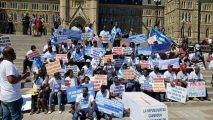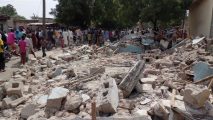Categories
Recent Posts
- CPDM Covid Scandal: Prosecutor seeks 10-Year ban for 4 officials
- Cameroon still faces power cuts despite full output from Nachtigal Dam
- Financial scandal rocks Mkpot Oil Mill Project!! Manyu Chiefs won’t talk
- Yaoundé: Defense Ministry says “Clear Alliance” between Boko Haram and criminals in recent attack
- Football: MTN Elite One resumes after boycott threats
Archives
- March 2025
- February 2025
- January 2025
- December 2024
- November 2024
- October 2024
- September 2024
- August 2024
- July 2024
- June 2024
- May 2024
- April 2024
- March 2024
- February 2024
- January 2024
- December 2023
- November 2023
- October 2023
- September 2023
- August 2023
- July 2023
- June 2023
- May 2023
- April 2023
- March 2023
- February 2023
- January 2023
- December 2022
- November 2022
- October 2022
- September 2022
- August 2022
- July 2022
- June 2022
- May 2022
- April 2022
- March 2022
- February 2022
- January 2022
- December 2021
- November 2021
- October 2021
- September 2021
- August 2021
- July 2021
- June 2021
- May 2021
- April 2021
- March 2021
- February 2021
- January 2021
- December 2020
- November 2020
- October 2020
- September 2020
- August 2020
- July 2020
- June 2020
- May 2020
- April 2020
- March 2020
- February 2020
- January 2020
- December 2019
- November 2019
- October 2019
- September 2019
- August 2019
- July 2019
- June 2019
- May 2019
- April 2019
- March 2019
- February 2019
- January 2019
- December 2018
- November 2018
- October 2018
- September 2018
- August 2018
- July 2018
- June 2018
- May 2018
- April 2018
- March 2018
- February 2018
- January 2018
- December 2017
- November 2017
- October 2017
- September 2017
- August 2017
- July 2017
- June 2017
- May 2017
- April 2017
- March 2017
- February 2017
- January 2017
- December 2016
- November 2016
- October 2016
- September 2016
- August 2016
- July 2016
- June 2016
Featured
Most Commented Posts
 4 Anglophone detainees killed in Yaounde
4 Anglophone detainees killed in Yaounde
18 comments Chantal Biya says she will return to Cameroon if General Ivo Yenwo, Martin Belinga Eboutou and Ferdinand Ngoh Ngoh are sacked
Chantal Biya says she will return to Cameroon if General Ivo Yenwo, Martin Belinga Eboutou and Ferdinand Ngoh Ngoh are sacked
13 comments The Anglophone Problem – When Facts don’t Lie
The Anglophone Problem – When Facts don’t Lie
12 comments Anglophone Nationalism: Barrister Eyambe says “hidden plans are at work”
Anglophone Nationalism: Barrister Eyambe says “hidden plans are at work”
12 comments Largest wave of arrest by BIR in Bamenda
Largest wave of arrest by BIR in Bamenda
10 comments
Latest Tweets
Featured
-

CPDM Covid Scandal: Prosecutor seeks 10-Year ban for 4 officials
-

Cameroon still faces power cuts despite full output from Nachtigal Dam
-

Financial scandal rocks Mkpot Oil Mill Project!! Manyu Chiefs won’t talk
-

Yaoundé: Defense Ministry says “Clear Alliance” between Boko Haram and criminals in recent attack
-

Football: MTN Elite One resumes after boycott threats
-

Biya’s election season stirs renewed anxiety in Southern Cameroons
-

Revealed: Boko Haram fighters kill 20 Cameroonian troops
© Cameroon Concord News 2025





23, January 2025
Southwest region draws half of recovery zone investments 0
Of the three economically distressed zones in Cameroon the Far North, Northwest, and Southwest the Southwest has emerged as the most appealing to investors. On January 15, Finance Minister Louis Paul Motazé revealed in Buea, the region’s capital, that it is home to half of the 33 projects benefiting from tax and customs incentives tied to this special status.
“The Southwest alone accounts for over half of the projected investments, with 17 companies involved,” Motazé said. He added that 10 companies in the region have also registered under Cameroon’s 2013 private investment promotion law, securing tax benefits and creating tens of thousands of jobs.
Indeed, unlike the Far North, which is economically underdeveloped, and the Northwest, which lacks industrial capacity, the Southwest has several advantages. Key cities like Buea, Limbe, Kumba, and Tiko are near Douala, Cameroon’s economic hub. An efficient road network connects the Southwest to Douala, simplifying trade and logistics.
The Southwest also shares a border with Nigeria, Cameroon’s largest trading partner, and has modern road infrastructure supporting cross-border trade. The Far North also borders Nigeria but lacks comparable infrastructure.
Proximity to the Atlantic Ocean further strengthens the region’s economic appeal. The Southwest hosts informal maritime trade with Nigeria and includes the Cap Limboh oil terminal, which supplies crude oil to Cameroon’s national refinery (Sonara). Plans to build a deep-sea port in Limbe could further boost the region’s economic potential.
In 2019, Cameroon designated the Far North, Northwest, and Southwest as economically distressed zones, granting businesses tax breaks and other incentives for three to ten years. This initiative aligns with a broader investment promotion law from 2013, revised in 2017.
The Far North received its designation due to repeated Boko Haram attacks since 2013, which have devastated its already fragile economy. The Northwest and Southwest regions, meanwhile, have faced unrest since 2016, driven by armed conflicts between government forces and separatist groups in the country’s Anglophone regions.
Source: Business in Cameroon